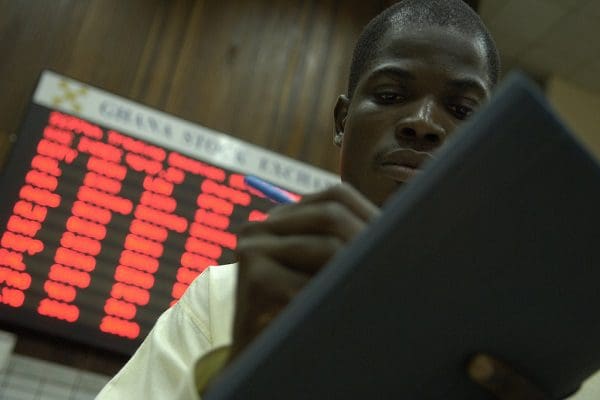The Ghana Stock Exchange witnessed an explosive surge in trading activity on Tuesday, with volumes more than tripling as banking stocks attracted massive institutional interest. Nearly 10 million shares changed hands during session 7065, marking one of the most active days of the year and pushing both major indices higher.
The GSE Composite Index climbed 21.69 points to close at 8,443.88, while the Financial Stocks Index posted an even stronger gain of 30.44 points, reaching 3,927.72. Market capitalization expanded to GH¢166.26 billion from the previous session’s GH¢165.99 billion, adding GH¢269 million in value.
CAL Bank emerged as the star performer, recording 6.2 million shares traded valued at GH¢4.53 million. That’s a remarkable jump from Monday’s relatively quiet 168,000 shares. The stock edged up one pesewa to close at GH¢0.73, but the real story was the sheer volume of shares moving through the market.
GCB Bank maintained its position as a heavy trader with 2.5 million shares worth GH¢38.07 million changing hands. MTN Ghana rounded out the top three most active stocks with 641,396 shares valued at GH¢2.90 million. Together, these three counters accounted for the bulk of Tuesday’s 9.9 million share volume.
The numbers tell a compelling story about shifting market dynamics. Monday’s session 7064 recorded 3.16 million shares traded, meaning Tuesday saw a 213 percent increase in volume. Trading value jumped 17.5 percent to GH¢46.06 million from Monday’s GH¢39.19 million.
Ecobank Ghana provided the day’s most significant price movement, climbing GH¢0.80 or 6.1 percent to close at GH¢14.00. That gain suggests specific positive sentiment around the lender, though details of what drove the buying interest weren’t immediately clear.
Most other actively traded stocks maintained their previous closing prices despite the heavy volumes. ETI held steady at GH¢0.92 after moving 391,725 shares worth GH¢360,387. Republic Bank Ghana traded 60,577 shares at GH¢72,692 without price changes. Access Bank saw minimal activity with just 341 shares changing hands.
The concentration of trading in banking stocks reflects broader patterns on the GSE, where financial institutions typically dominate daily activity. With 15 stocks recording trades during the session, the market showed reasonable breadth, though several listed companies remained untraded.
Year to date performance remains modest but positive. The Composite Index is up 0.73 percent for 2025, while the Financial Stocks Index has gained 0.65 percent. Those gains come after Ghana’s economy showed signs of stabilization following years of fiscal challenges and debt restructuring.
The volume surge suggests institutional investors are repositioning portfolios, possibly responding to improved economic fundamentals or attractive valuations in the banking sector. When major blocks of shares move through the market without significant price disruption, it often indicates coordinated buying or selling by large investors.
Banking sector fundamentals have strengthened in recent quarters as Ghana’s inflation rate declined and the cedi stabilized against major currencies. Banks benefited from higher interest rates earlier in the year, though rates have started easing as inflation pressures cooled. Net interest margins remained healthy across most lenders.
The controlled price movements despite massive volumes demonstrate market depth and liquidity improvements. In thinner markets, sudden volume spikes typically trigger volatile price swings. Tuesday’s relatively stable pricing suggests there was adequate supply to meet the surge in buying interest without forcing prices sharply higher.
Market watchers will be keen to see whether Tuesday’s activity represents a sustainable uptick or a one off surge. Consistent higher volumes would signal growing investor confidence and improved market liquidity. Both factors are essential for the GSE to attract more listings and deepen capital formation.
The exchange operates continuous trading from 10:00 AM to 3:00 PM on weekdays, with a pre-market session from 9:30 AM to 10:00 AM. That relatively short trading window, combined with limited market participants, means activity can concentrate intensely when institutional investors make moves.
Corporate earnings season is approaching, which could explain some of the positioning. Investors may be accumulating shares ahead of quarterly results they expect will show improved performance. Banking sector earnings have generally trended positively as loan books expanded and asset quality metrics stabilized.
Ghana’s broader economic recovery supports equity market sentiment. The government’s debt restructuring program is progressing, inflation has declined substantially from 2023 peaks, and foreign exchange pressures have eased. These macroeconomic improvements create a more favorable environment for risk assets like equities.
However, challenges remain. Interest rates, while declining, are still relatively high by historical standards. Economic growth, though improving, remains modest. Many companies continue navigating tight operating conditions and elevated costs. The GSE’s year to date gains of less than 1 percent reflect these mixed fundamentals.
Tuesday’s session demonstrated that liquidity exists when buyers and sellers find compelling reasons to transact. The question is whether such activity can become more consistent rather than episodic. For the GSE to fulfill its potential as a capital raising platform, it needs sustained participation from both retail and institutional investors.
The Financial Stocks Index outperforming the broader Composite Index underscores banking sector leadership. Financial stocks carry significant weight in both indices, so their performance largely drives overall market direction. When banks rally, the GSE rallies. When they stagnate, the market typically follows.
With market capitalization now above GH¢166 billion, the GSE represents a meaningful component of Ghana’s financial system. Yet trading remains concentrated in a handful of large caps, limiting opportunities for portfolio diversification and price discovery across the full spectrum of listed companies.
As the week progresses, investors will watch whether Tuesday’s momentum carries forward or represents an isolated burst of activity. Either way, the 213 percent volume surge and solid index gains provided a welcome shot of energy to a market that too often trades in fits and starts.
Source: newsghana.com.gh











